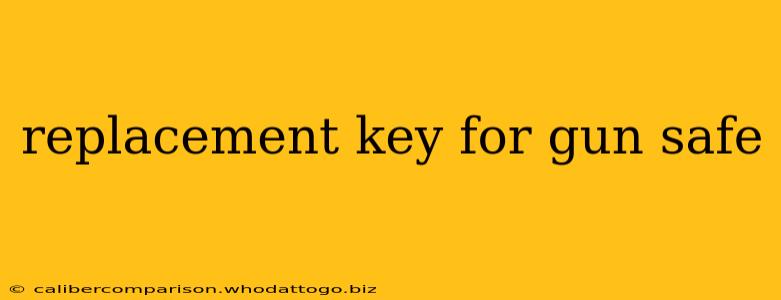Losing the key to your gun safe is a stressful experience. The security of your firearms and valuables is paramount, so finding a solution quickly and efficiently is crucial. This guide provides a comprehensive approach to replacing your gun safe key, covering various scenarios and offering practical advice.
Understanding Your Gun Safe's Locking Mechanism
Before you begin your search for a replacement key, it's vital to understand the type of lock your gun safe utilizes. Most gun safes employ one of the following locking mechanisms:
- Combination Locks: These safes require a specific numerical code to unlock. Losing a key isn't applicable here, but forgetting the combination necessitates a different approach (see below).
- Key Locks: These safes use a traditional key to unlock. This is the most common scenario for needing a replacement key. The key might be a standard key, a specialized key, or even a high-security key.
- Electronic Locks/Keypads: These safes often utilize a digital keypad or biometric scanner. Loss of a physical key isn't relevant here unless a physical key is a backup access method.
Locating Your Replacement Key
The first step is to exhaust all possible avenues for locating your existing key:
- Thorough Search: Conduct a meticulous search of your home, office, and vehicle. Check common areas where you might have placed it temporarily (e.g., pockets, drawers, desk organizers).
- Ask Family Members: If other individuals have access to your safe or its key, inquire if they've seen it.
- Check Keychains/Keyrings: Examine all your keychains and keyrings in detail. The key might be attached to another key.
Obtaining a Replacement Key: Different Scenarios
If you've thoroughly searched and still haven't found your key, you have several options depending on your safe's manufacturer and lock type:
1. Contacting the Gun Safe Manufacturer
This is often the most straightforward approach, especially for safes from reputable brands. Many manufacturers keep records of key codes or can provide instructions on obtaining a replacement. You will likely need to provide proof of purchase or the safe's serial number.
2. Consulting a Locksmith
A qualified locksmith specializing in gun safe locks is your best bet if you can't locate the key or contact the manufacturer. Locksmiths have the tools and expertise to identify the lock type and either create a new key or potentially bypass the lock entirely. Be prepared to provide identification and possibly proof of ownership for the safe.
3. Dealing with Lost Combination Locks
If you have a combination lock safe and have forgotten the combination, contacting the manufacturer or a professional locksmith remains the most viable solution. It's crucial to use a reputable locksmith who understands the intricacies of safe combinations and will not attempt to damage your safe in the process.
4. High-Security Locks
High-security locks necessitate a more cautious approach. Attempting to open them without proper expertise can lead to irreparable damage. Always contact a reputable locksmith experienced with these types of locks.
Choosing a Reputable Locksmith
When selecting a locksmith, consider these factors:
- Licensing and Insurance: Ensure the locksmith is licensed and insured. This protects you from potential damages during the process.
- Reputation and Reviews: Check online reviews and testimonials to gauge their reputation and customer satisfaction.
- Specialization: Confirm the locksmith's experience in handling gun safes and the specific lock type on your safe.
- Transparency: A reputable locksmith will be upfront about pricing and the process involved.
Losing your gun safe key is a significant security concern. By following this guide, you can navigate the process efficiently and restore the security of your firearms and valuables. Remember, always prioritize safety and professionalism when dealing with gun safe security.

